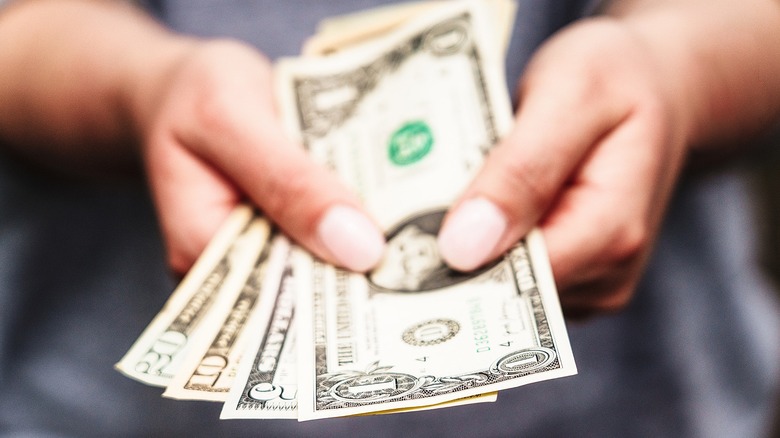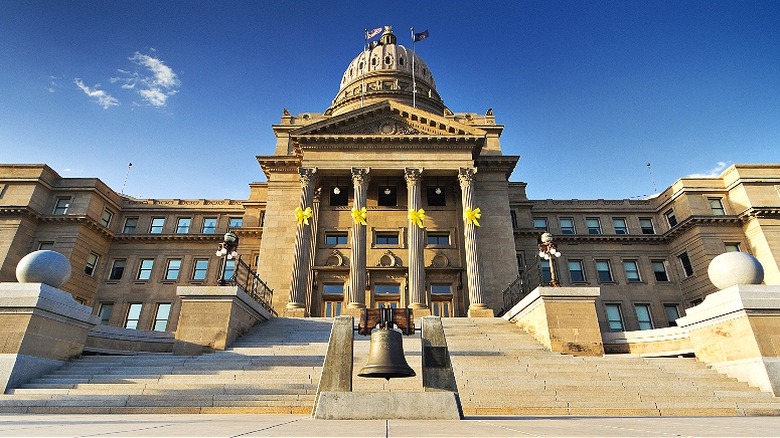How Some Americans Qualify For $500 A Month With No Obligation
Among the many potential economic policies that have been thrown out in recent years, perhaps none have been as intriguing as the idea of guaranteed (or universal) basic income. The concept is simple enough: Americans receive a set amount of money every month, no strings attached, to spend on whatever they need most. According to Business Insider, over 100 different cities in the United States have piloted a guaranteed basic income program since 2019, with most targeting low-income participants as a way to combat poverty in some of the country's most dangerous cities. Depending on the program, participants could be offered anywhere from $50 to $2,000 a month for a specific period of time.
Although the results of these basic income programs have been overwhelmingly positive for the participants, maintaining the long-term funding necessary to keep them going has been complicated. Since many of the pilot programs enacted were funded through stimulus money as a result of the COVID-19 pandemic, finding the necessary program funding post-pandemic has been difficult.
The funding situation has been made even harder thanks to Republican-led campaigns to label the concept as both "socialist" and an incentive for low-income Americans to not work. Despite research finding higher employment outcomes for program participants, conservatives maintain guaranteed income is a negative for society. As Michael Tubbs, the former mayor of Stockton, California, and co-founder of Mayors & Counties for a Guaranteed Income, said to Bloomberg, "It's interesting that so much of the misguided government pushback against guaranteed income has happened already when the horse has left the gate."
Guaranteed income backlash
It's worth emphasizing that there exists a stark political divide on the concept of guaranteed basic income. In fact, conservative states are so opposed to the premise that they have even begun to ban it. South Dakota, Idaho, and Iowa (all Republican-led states) passed laws during the 2023-24 legislative session that banned the counties and cities in their states from making guaranteed income program payments. Similarly, Arkansas enacted a law with the express intent of preemptively blocking any local attempts at creating universal basic income programs in the state. West Virginia has introduced a similar act (though it has yet to be voted on). Arizona, Wisconsin, and Mississippi also advanced legislation aimed at banning universal basic income programs, but their Democratic governors blocked the legislation from being enacted.
Strangely enough, many of the states that have pursued legislation on blocking guaranteed income programs don't even offer the programs in the first place. This highlights the conservative politicizing of the program's concept, as opposed to a genuine voter-based opposition to guaranteed basic income policy. Note that most of the bills introduced in these states contain similar language and goals, and that's largely because the bills have all been pushed by a group known as the Opportunity Solutions Project; this group functions as the lobbying wing of the Foundation for Government Accountability, a conservative think tank dedicated to eliminating social safety-net programs (like SNAP benefits, Medicaid, and even child labor laws).
Guaranteed income programs
While many cities have successfully piloted guaranteed income programs, not all of them have been able to keep their programs going. Primarily, this has been due to funding, or the lack thereof, which has only been exacerbated by the conservative campaigns that want to ban the programs. That said, some places are keeping the momentum going. One particularly successful program in Los Angeles County, known as Breathe, was actually able to expand in August 2024 to offer an additional 2,000 foster youths (between ages 18 and 21) $500 a month for 18 months. Launched in 2022, the Breathe program currently provides $1,000 a month to 1,000 participants over the course of three years and expanded to offer 200 former foster youths $1,000 a month for two years starting in 2023.
It's important to realize just how much good these programs can do for those who need it the most. Research has shown that guaranteed income programs have not only been able to pull Americans out of poverty but also improve health outcomes and job prospects (which can be especially important in states with a high cost of living). Much of the data collected on the positive outcomes of these pilot programs comes from the Stanford Basic Income Lab and the University of Pennsylvania's Center for Guaranteed Income Research. Currently, the lab and center track 8,495 participants in 65 active guaranteed basic income programs across the United States, and provide important spending data on participants that back up the idea that Americans will prioritize purchasing their basic needs when provided with enough money to do so.


